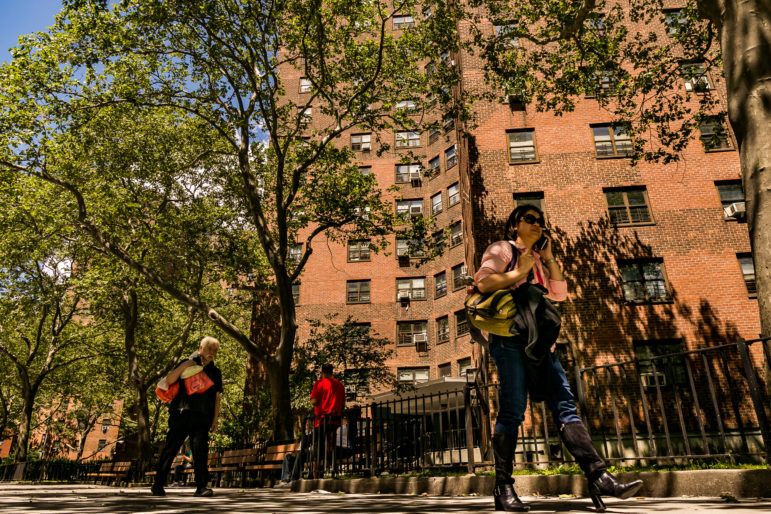
Adi Talwar
NYCHA's LaGuardia Houses in the lower East side section of Manhattan.
Yolanda Franceschi was recovering from surgery in her apartment in East Harlem’s Taft Houses. It was winter when the conditions in her apartment continued to worsen, and she was facing the frigid cold that was seeping through the broken windows in her apartment. By January, she placed several tickets with NYCHA in order to receive needed repairs, but to no avail – her tickets were placed on an expanding waiting list, and NYCHA maintenance failed to fulfill their scheduled appointments. Her windows remained broken for two months before NYCHA finally completed the repairs. By then, Yolanda had endured most of the winter in a freezing apartment.
East Harlem is not the only public housing community bearing the brunt of disrepair and foul housing conditions. At a recent 303 Vernon Ave. Tenants Association, close to a dozen senior tenants in the development expressed their disdain with NYCHA. Tenants living in the building have dealt with intermittent water shutoffs for over a year and at times shutoffs last for days. This is not an isolated issue and in the wealthiest city in the world, no resident should go without access to water and essential quality of life housing services.
NYCHA is in crisis and Albany is able to act. The suffering and injustice that NYCHA residents have endured is staggering, and the mounting crisis for capital repairs has been fully exposed in the past year. The deceptive and widespread work order practices have burdened and threatened the safety and well-being of residents in each borough; hundreds of previously unreported lead poisoned children, and thousands of households are without heat or hot water each winter.
Restoring dignity and living conditions for NYCHA residents must remain a top priority for the legislature in the final days of session. At least $250 million should be allocated to the housing authority this year to help achieve compliance with federal health and safety regulations. But that’s not the only way Albany can help, and we must find solutions under every unturned stone. The upcoming expiration of a real estate tax abatement that has provided outsized benefits to luxury real estate owners is an opportunity to reset housing priorities. The use of this tax break was further brought to our attention when one outsized beneficiary, President Trump, was revealed by the Daily News to have claimed $49,000 using the break before the city nixed it.
So we’re taking the necessary action, and we’re cosponsoring legislation that will reform the Cooperative/Condominium Property Tax Abatement by ending tax breaks for luxury owners who don’t need them. The top three largest abatements in the city each amount to more than $44,000 every year. Those represent just 17 percent of a luxury owner’s tax bill, and nearly double of the average annual household income of $24,000 for NYCHA residents. It is common sense that we should repeal another tax abatement for the wealthy in order to help fund much needed repairs for the vulnerable in public housing.
With $32 billion in outstanding repairs needed for NYCHA, impacting the health and safety of more than 400,000 New Yorkers, we cannot afford to continue handing out tax breaks to luxury real estate while public housing residents suffer. Let’s use our new majority in the legislature to fix this problem in a lasting way by providing steady and ongoing revenue to NYCHA.
Get the best of City Limits news in your inbox.
Select any of our free weekly newsletters and stay informed on the latest policy-focused, independent news.
Undoubtedly, our bill recognizes the need to maintain tax relief for the middle class, and will continue to do so for 90 percent of homeowners that are currently receiving the abatement. But luxury owners in the hottest real estate markets will be asked to pay their full property tax bill – their fair share. This will generate $170 million in revenue each year which can raise $3.3 billion in bond financing for NYCHA capital needs. This begins to take a more equitable approach to housing policy, and the critical steps needed to close the NYCHA funding gap.
Our battle for tenant rights doesn’t just stop at private housing, but it must expand to all public housing tenants. The tenant movement doesn’t exclude anyone; it grows stronger by uniting shared struggles, by demanding equal dignity, by eliminating the injustices that pervade our homes.
As we expand tenant rights this June, we must include the rights of public housing residents to decent and fair housing.
Rodriguez represents Central Harlem, East Harlem, and Upper East Side in the state Assembly and Salazar represents Bushwick, Greenpoint, and Williamsburg in the state Senate.









2 thoughts on “Opinion: Abolish This Luxury Property Tax Break and Save NYCHA”
“Undoubtedly, our bill recognizes the need to maintain tax relief for the middle class, and will continue to do so for 90 percent of homeowners that are currently receiving the abatement” There was nothing in this editorial that explained this very important part of this legislation, can someone elaborate. Also as legislators why are you not evaluating the inequality of homeowners throughout the city i.e. taxes for some houses in Park Slope are actually less than those for a Co-op apartment in Manhattan. That would greatly help the middle class.
“With $32 billion in outstanding repairs needed for NYCHA, impacting the health and safety of more than 400,000 New Yorkers”
Instead of spending 32 Billion dollars on repairs, why not sell all the buildings for at least twice that amount ($64,000,000,000) on the free market, and give each family living there $364,389.98 (64 Billion/175,636 – the number of units in public housing in NYC) which is enough to buy an apartment . and eliminate the non functioning & negligent agency.